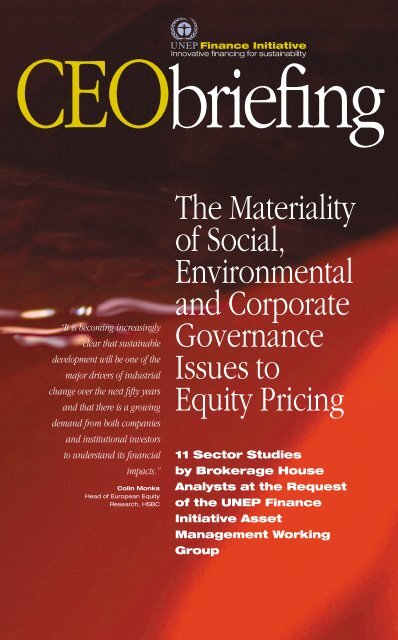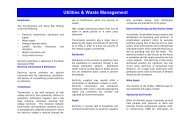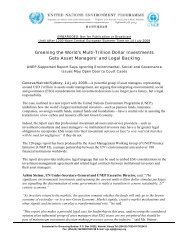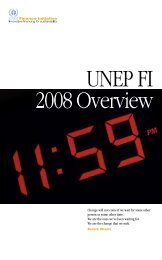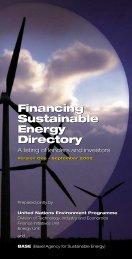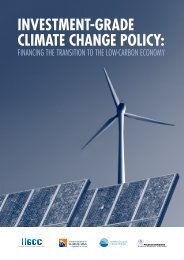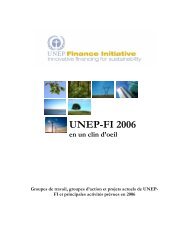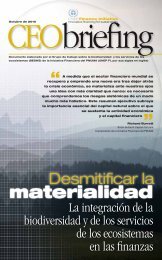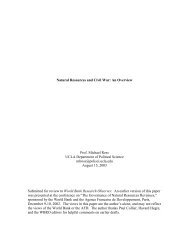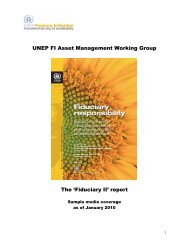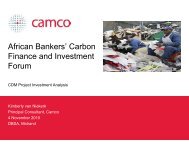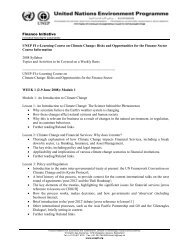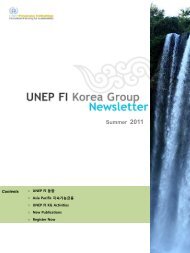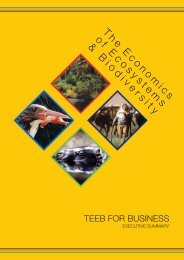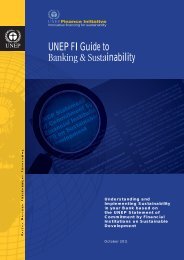CEO Briefing - UNEP Finance Initiative
CEO Briefing - UNEP Finance Initiative
CEO Briefing - UNEP Finance Initiative
You also want an ePaper? Increase the reach of your titles
YUMPU automatically turns print PDFs into web optimized ePapers that Google loves.
<strong>CEO</strong>briefing<br />
“It is becoming increasingly<br />
clear that sustainable<br />
development will be one of the<br />
major drivers of industrial<br />
change over the next fifty years<br />
and that there is a growing<br />
demand from both companies<br />
and institutional investors<br />
to understand its financial<br />
impacts.”<br />
Colin Monks<br />
Head of European Equity<br />
Research, HSBC<br />
The Materiality<br />
of Social,<br />
Environmental<br />
and Corporate<br />
Governance<br />
Issues to<br />
Equity Pricing<br />
11 Sector Studies<br />
by Brokerage House<br />
Analysts at the Request<br />
of the <strong>UNEP</strong> <strong>Finance</strong><br />
<strong>Initiative</strong> Asset<br />
Management Working<br />
Group
Background<br />
from the AMWG Chairs<br />
“Our engagement<br />
in this project<br />
has strengthened<br />
Storebrand's<br />
conviction that<br />
Environmental,<br />
Social and Corporate<br />
Governance<br />
issues must<br />
increasingly<br />
feature in the<br />
activities<br />
of corporate<br />
leaders.”<br />
Idar Kreutzer<br />
<strong>CEO</strong>, Storebrand<br />
An increasing number of institutional investors are becoming interested in approaches to<br />
asset management that explicitly include environmental, social and corporate governance<br />
criteria or metrics, either for ethical reasons or where they are or may become relevant to<br />
investment performance.<br />
While there are increasing pressures for investment managers to address these issues,<br />
however, they have generally received little consideration from brokerage house analysts<br />
and policy-makers.<br />
The twelve members of our group, along with many other large financial institutions<br />
worldwide, have signed or are considering signing a United Nations Environment<br />
Programme declaration that pledges us to integrate these issues into our products and<br />
operations.<br />
In April 2003 in response to investor demand and in fulfilment of our obligations as<br />
signatories to this pledge we constituted an Asset Management Working Group (AMWG)<br />
within the United Nations Environment Programme <strong>Finance</strong> <strong>Initiative</strong> (<strong>UNEP</strong> FI) to explore<br />
and document the materiality of environmental, social and corporate governance<br />
considerations and criteria as they relate to the portfolio management of mutual and other<br />
institutional funds.<br />
From August to October of 2003 we invited more than 50 major stock brokerage firms with<br />
whom we do a significant amount of business to be responsive to our request for an<br />
analysis of seven industry sectors as defined by Morgan Stanley Capital International (see<br />
project timeline).<br />
The analysts were requested to identify specific environmental and social criteria likely to<br />
be material for company competitiveness and reputation in those sectors. We also asked<br />
the analysts to the extent possible to quantify their potential impact on stock price.<br />
Project Timeline<br />
1. April 2003: Launch<br />
■ Twelve Asset management firms launch an asset<br />
management working group under <strong>UNEP</strong> FI to explore and<br />
document the materiality of environmental and social<br />
considerations and criteria as they relate to the portfolio<br />
management of mutual funds, pension funds and other<br />
institutional funds.<br />
2. May–September 2003: Planning and Invitation<br />
■ Identify the heads of research and brokerage house<br />
analysts from more than 50 brokerage houses with whom<br />
the group does significant business.<br />
■ Agree on and send a letter to the above firms requesting<br />
special sector reports (without financial compensation) on<br />
extra financial issues in seven sectors.<br />
3. October–December 2003: Response<br />
■ 14 reports from 11 firms confirmed.<br />
4. January – April 2004: Broker Research<br />
■ Four reports withdrawn from project.<br />
■ One report added.<br />
■ One sector changes from apparel to aviation.<br />
5. May – June 2004: Comment and Analysis<br />
■ Final output: 11 brokerage house analyst reports.<br />
■ Group compiles comments on reports.<br />
■ Results compiled in collaboration with the UN Global<br />
Compact.<br />
6. June 2004: Launch<br />
■ At UN Global Compact Leaders Summit<br />
Asset Management Working Group Member Firms<br />
■<br />
■<br />
■<br />
■<br />
■<br />
■<br />
Acuity Investment Management, Canada<br />
BNP Paribas Asset Management, France<br />
Calvert Group Ltd., USA<br />
Citigroup Asset Management, USA<br />
Groupama Asset Management, France<br />
Morley Fund Management, UK<br />
■<br />
■<br />
■<br />
■<br />
■<br />
■<br />
Nikko Asset Management, Japan<br />
Old Mutual Asset Managers, South Africa<br />
San Paolo IMI Asset Management, Italy<br />
Storebrand Investments, Norway<br />
ABN AMRO Asset Management, Brazil<br />
HSBC Asset Management, Europe
“This project<br />
clearly indicates<br />
that companies that<br />
treat governance<br />
and sustainability<br />
issues with importance<br />
are better<br />
positioned to deliver<br />
long-term, sustainable<br />
value to their<br />
shareholders.”<br />
Barbara J. Krumsiek<br />
President & <strong>CEO</strong>, Calvert<br />
By April 2004 we had received 11 reports from 9 brokerage houses.<br />
The results of the research were telling:<br />
■ There was agreement that environmental, social and corporate governance issues affect<br />
long-term shareholder value. In some cases those effects may be profound.<br />
■ The majority of analysts noted difficulties in comparative analysis due to the range of<br />
reporting practices for environmental, social and corporate governance risks and<br />
opportunities.<br />
■ Financial research was greatly aided by clear government positions with respect to<br />
environmental, social and corporate governance issues. In some cases analysts were not<br />
able to provide in-depth reports due to a lack of certainty regarding government policy.<br />
These results provide strong independent support for the thesis that effective management<br />
of these issues will contribute to growing shareholder value. We therefore feel that they<br />
should be taken into account in fundamental financial analysis and thus investment<br />
considerations. In light of these findings:<br />
We urge corporate managers and board directors:<br />
■ To include environmental, social and corporate governance reporting in their annual<br />
reports and financial statements.<br />
■ To urge the trustees of their employee pension funds to invest pension fund assets in a<br />
manner that reflects the strong links between social, environmental and financial<br />
performance.<br />
We also urge governments to:<br />
■ Recognise that in general, current definitions of trustee fiduciary duty, financial materiality<br />
and corporate disclosure requirements do not incorporate or ensure the integration of<br />
environmental, social and corporate governance issues into fundamental company analysis.<br />
■ Ensure that the assets of their public employee pension funds are invested in a manner<br />
that reflects the strong links between social, environmental and financial performance.<br />
We therefore call on regulatory bodies to:<br />
■ Update their regulations of public and private trustee fiduciary duty and of financial<br />
materiality to include consideration of material environmental, social and corporate<br />
governance issues.<br />
■ Update financial disclosure regulations for companies and stock exchanges to require<br />
specific disclosure of environmental, social and corporate governance criteria.<br />
Based on our own experience and the results of this research we see environmental, social<br />
and corporate governance issues as being an integral part of successful management in the<br />
modern World. We therefore strongly feel that they should be taken into account in<br />
financial analysis and in investment management.<br />
Starting in 2004 our group is planning to begin tracking global integration of environmental,<br />
social and corporate governance criteria into the work of investors, asset managers and<br />
capital markets on an annual basis. We will do this using a ten-point list of indicators<br />
described in the upcoming activities section of this report.<br />
These indicators are based on both the results of the broker research, our own experience<br />
and on the recommendations of the UN Global Compact high-level initiative on best<br />
practice in financial analysis.<br />
Sincerely,<br />
Carlos Joly<br />
Co-Chair:<br />
<strong>UNEP</strong> FI Asset Management Working Group<br />
Advisor to the <strong>CEO</strong><br />
Storebrand Investments, Norway<br />
Vincent Zeller<br />
Co-Chair:<br />
<strong>UNEP</strong> FI Asset Management Working Group<br />
General Manager and Chief Investment Officer<br />
Groupama Asset Management, France
Project findings<br />
“We strongly believe<br />
in full and consistent<br />
disclosure of<br />
CSR data by companies<br />
so that they<br />
can be included in<br />
fundamental company<br />
analysis,<br />
where we believe<br />
that they belong.”<br />
Anthony Ling<br />
Co-Director of Research,<br />
Goldman Sachs Europe<br />
1<br />
Environmental,<br />
■<br />
social and corporate governance<br />
criteria affect shareholder value both in the short<br />
and long term.<br />
Analysts agreed that environmental, social and corporate governance criteria impact<br />
both positively and negatively on long-term shareholder value. In some cases these effects<br />
may be profound. It follows that research to determine the financial materiality of these<br />
criteria should use longer time spans than is currently the norm for financial analysis.<br />
2<br />
Governments can reduce barriers to environmental,<br />
social and corporate governance analysis by<br />
mandating and standardising the inclusion of these<br />
criteria in national and international financial disclosure<br />
frameworks.<br />
■ Most reports and AMWG members agreed that financial analysis of these criteria would<br />
be made easier if governments, via their financial regulators, clarify and/or enforce<br />
existing or develop new financial disclosure regulations and standards to specifically<br />
include disclosure of these criteria where they have been shown to be material.<br />
■ Definitions of fiduciary duty and financial materiality within these frameworks should<br />
also be revised to incorporate consideration of environmental, social and corporate<br />
governance criteria.<br />
■ The Global Reporting <strong>Initiative</strong> should ensure that its reporting guidelines are relevant<br />
for and communicated to the financial community and financial regulators.<br />
3<br />
Innovative techniques are being developed to<br />
perform financial analyses of environmental, social<br />
and corporate governance criteria in response to<br />
growing investor demand.<br />
Examples include:<br />
■ Surveys<br />
Surveys were used to gather information on and rank company performance for<br />
environmental, social and corporate governance criteria not normally disclosed in<br />
company financial statements.<br />
It is possible that no set of financial indicators would show any link to performance if<br />
analysed using a small number of companies. We therefore encourage analysts to use<br />
larger numbers of companies when performing analysis of this nature.<br />
Examples:<br />
Goldman Sachs Global Energy Research<br />
Introducing the Goldman Sachs Energy Environmental and Social Index<br />
West LB Equity Markets Pan-European Equities<br />
Insurance and Sustainability: Playing with Fire<br />
■ Portfolio analysis<br />
The best analyses used financial metrics to compare best from worst performers for a<br />
given set of environmental social and corporate governance criteria against existing stock<br />
portfolios. The comparison helped analysts evaluate the financial impact of chosen criteria<br />
for a given industry sector. This is an important step beyond identifying potential criteria<br />
for analysis and determining best and worst performers.<br />
Example:<br />
Deutsche Bank Global Equity Research<br />
Beyond the Numbers: Corporate Governance: Implication for Investors
“Deutsche Bank<br />
Equity Research<br />
team believes that<br />
corporate<br />
governance is a<br />
critical element of<br />
equity risk and as<br />
such, deserves to<br />
be measured and<br />
considered in the<br />
investment<br />
decision-making<br />
process.”<br />
Russell Duckworth<br />
Global Head of<br />
Equity Research,<br />
Deutsche Bank<br />
■ Scenario analysis<br />
Analysts used scenario analysis to evaluate potential impacts of upcoming regulation on<br />
companies. This analysis was also used when government positions on a particular<br />
environmental, social and corporate governance issue were clearly articulated policy or<br />
position papers.<br />
Example:<br />
UBS Global Equity Research<br />
European Emissions Trading Scheme - Bonanza or Bust?<br />
4<br />
Brokerage houses in the European Union are<br />
increasingly willing and able to respond to demand for<br />
environmental, social and corporate governance<br />
research.<br />
■ We received a 20% response rate to our invitation to provide this research. In the future<br />
we expect that growing awareness of the financial materiality of these criteria will drive<br />
demand for further research. Specifically, increasing numbers of institutional investors,<br />
fund managers and financial institutions will need to explicitly request and reward<br />
research on environmental, social and corporate governance criteria.<br />
5<br />
In response to the AMWG Materiality research report,<br />
brokerage houses in the United States and Canada<br />
will likely be interested in the findings of their European<br />
counterparts, and as a result may pursue exploring<br />
this type of research in their future sector reports.<br />
■ No North American brokerage houses responded positively to our invitation.Those that<br />
responded to the AMWG declined on the basis of a perceived difficulty in analysis due to<br />
barriers associated with inadequate disclosure of these criteria (see Finding number two),<br />
internal restructuring, or a lack of research capacity.<br />
Policy-makers and investors may be the most effective catalysts for North American<br />
research firms to incorporate social, environmental and corporate governance indicators<br />
into their work.<br />
Contributing Brokerage Houses and Respective Report Titles<br />
1 ABN AMRO Equities United Kingdom<br />
Pharmaceuticals<br />
2 Deutsche Bank Global Equity Research<br />
Beyond the Numbers: Corporate Governance:<br />
Implication for Investors<br />
3 Deutsche Securities South African<br />
Equity Research<br />
No Evidence to Link Share Ratings with Good<br />
Corporate Citizenship...Yet<br />
4 Dresdner Kleinwort Wasserstein<br />
Europe / Equity<br />
Utilities: Emission trading - Carbon Derby Part II:<br />
And they’re off<br />
5 Dresdner Kleinwort Wasserstein UK /<br />
Europe / Equity<br />
Transport: Aviation emissions: Another cost to bear<br />
6 Goldman Sachs Global Energy Research<br />
Introducing the Goldman Sachs Energy Environmental<br />
and Social Index<br />
7 HSBC<br />
European Utilities II<br />
8 NikkoCitigroup Japan Equity Strategy<br />
The Global Environment and Socially Responsible<br />
Investment: Environmental Technologies Fuelling<br />
Zones of Growth<br />
9 Nomura Japanese Equity Markets<br />
Corporate social responsibility (CSR) in the nonlife<br />
insurance sector<br />
10 UBS Global Equity Research<br />
European Emissions Trading Scheme -<br />
Bonanza or Bust?<br />
11 West LB Equity Markets Pan-European<br />
Equities<br />
Insurance and Sustainability: Playing with Fire
AMWG upcoming<br />
activities<br />
“A critical next<br />
step will be the<br />
implementation of<br />
the recommendations<br />
of this project<br />
by investors,<br />
analysts, and<br />
public sector<br />
policy-makers.”<br />
Klaus Töpfer<br />
Executive Director,<br />
United Nations<br />
Environment<br />
Programme<br />
1. Engagement with Investors.<br />
■ Convey results of the project to institutional investors, mutual funds, fixed income<br />
investors, and public and private pension funds worldwide using workshops, Internet and<br />
print outreach.<br />
2. Monitor Global Uptake of Results.<br />
■ Beginning in July 2005 the AMWG will seek to begin tracking global uptake of the<br />
recommendations of the UN Global Compact report on best practice in financial analysis<br />
and of the <strong>UNEP</strong> FI study.<br />
■ To facilitate accurate analysis the members have distilled the UN Global Compact<br />
financial sector recommendations into a workable ten-point set of criteria.<br />
3. Launch of a Second Round of this Project.<br />
■ Date to be determined. Interested asset managers and brokerage houses can contact<br />
the AMWG secretariat by emailing materiality@unepfi.net.<br />
Ten Point Indicators for Capital Markets<br />
The <strong>UNEP</strong> FI AMWG will monitor implementation along the lines of the following indicators.<br />
The AMWG encourages the promotion of the practices embodied in these indicators.<br />
Investors<br />
1 Government and multilateral agency pension funds<br />
that integrate consideration of environmental, social and<br />
corporate governance criteria into their investment<br />
mandates where appropriate.<br />
2 Trustees and their selection consultants who integrate<br />
environmental, social and corporate governance issues into<br />
their formulation of investment mandates and selection of<br />
investment managers.<br />
Capital Markets<br />
3 Investors who specify their proxy voting guidelines on<br />
environmental, social and corporate governance matters.<br />
Asset Managers<br />
4 Top management and boards that take a leadership<br />
role.<br />
5 Brokerage houses that are appropriately equipped to<br />
integrate environmental, social and corporate governance<br />
issues into fundamental company analysis.<br />
6 Asset Management firms that are actively requesting<br />
brokerage house research on environmental, social and<br />
corporate governance criteria in fundamental analysis.<br />
7 Asset management firms whose performance and<br />
incentive systems reward environmental, social and<br />
corporate governance research.<br />
8 Stock exchanges that include environmental, social and<br />
corporate governance criteria in their listing particulars for<br />
companies.<br />
9 Accounting bodies and rating agencies that integrate<br />
environmental, social and corporate governance criteria into<br />
their frameworks.<br />
10 Global Reporting <strong>Initiative</strong> interaction with local and<br />
international investment research bodies.<br />
<strong>UNEP</strong> Representative: Paul Clements-Hunt. Project Manager: Jacob Malthouse<br />
International Environment House • 15 chemin des Anémones • 1219 Châtelaine • CH-Genève<br />
Tel +41 22 917 8116 Fax +41 22 917 8076 www.unepfi.net<br />
The designations employed and the presentations of the material in this publication do not imply the expression of any opinion whatsoever on the part of the United Nations Environment<br />
Programme (<strong>UNEP</strong>), the United Nations Environment Programme <strong>Finance</strong> <strong>Initiative</strong>s (<strong>UNEP</strong> FI), or any of its member organisations, concerning the legal status of any country, territory, city<br />
or area or of its authorities, or concerning the delimitation of its frontiers or boundaries. Morever, the views expressed do not necessarily represent the decisions or the stated policy<br />
of <strong>UNEP</strong>, <strong>UNEP</strong> FI or any of the contributing member organisations of <strong>UNEP</strong> FI. The citing of trade names or commercial processes does not constitute endorsement.<br />
Design and production: Rebus, Paris. Printed in France


